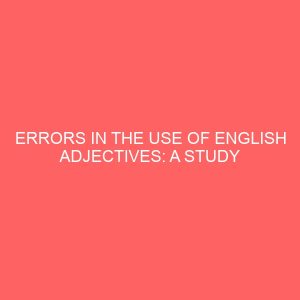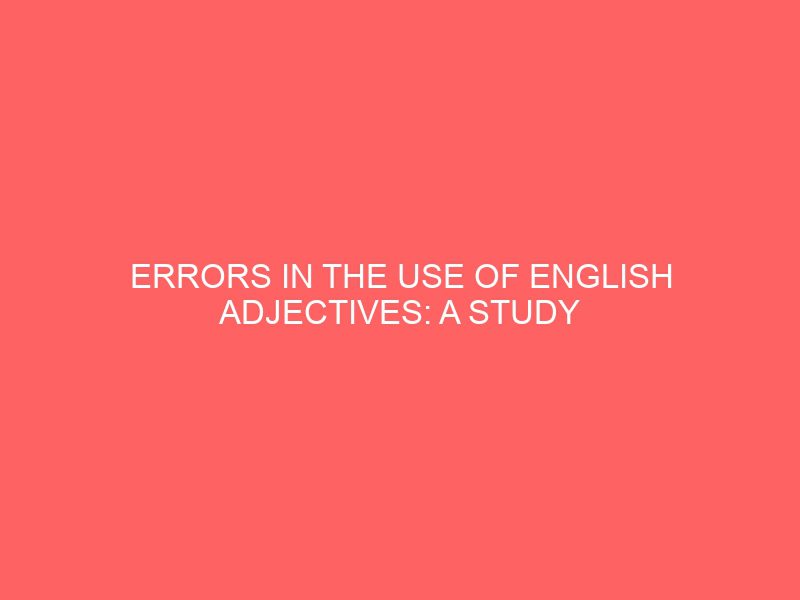Description
Abstract
This study was conducted with the aim of identifying the errors in the use of English adjectives among second language learners with particular reference to selected secondary schools in Awka South Local Government Area of Anambra State. Also with the intention of possibly recognizing error competence as a new variable related to L2 learners structural weakness. It explored the nature of English adjectives; the errors committed by L2 learners and proffered solutions to alleviating the problems. The researcher observed that the English adjective main syntactic role is to qualify a noun or noun phrase, giving more information about the object signified. The adjective category performed the syntactic function of ascribing superiority or inferiority of quality and property to persons, objects etc. Both field and library researches were used to get the facts needed for the analysis. Five research questions guided the study with a view to discovering the degree to which L2 learners commit errors in their use of English adjectives. Also the relationship between error competence and structural competence of L2 learners in the use of English adjectives were examined. Three secondary schools were selected using simple random sampling. Forty students were selected from each school which comprised SS1 and SS2 students. The total number of students selected were one hundred and twenty in all. The researcher made use of questionnaire and structural test questions as the research instruments. The structural test was divided into two parts: a blank filling test and a multiple-choice test. These tests were given to test students proficiency level i.e. real knowledge in the use of English adjectives while the questionnaire was used to assess error competence of learners. The result, therefore, revealed that the blank filling test questions depicted the students real knowledge of the English adjectives. Also the result showed that certain error types are problematic to L2 learners thereby increasing their tendency in committing errors on their usages. Effective assimilation is required by users to attain mastery of the use of English adjectives. Based on the findings some recommendations which aimed at improving the learning of English language were made. The researcher suggested that further studies of this kind be conducted in other word class to know where lapses existed for improvement. In conclusion, this investigation has paved the way to support the idea of having error competence as a strategy which needs training and management.
Table of Contents
Title page i
Approval page ii
Certification iii
Acknowledgements iv
Dedication v
Abstract vi
Table of contents vii
CHAPTER ONE
1.1 Background to the Study 1
1.2 Statement of the Problem 2
1.3 Purpose of the Study 3
1.4 Significance of the Study 3
1.5 Scope and Limitations of the Study 4
1.6 Research Questions 5
CHAPTER TWO
REVIEW OF SCHORLASHIP
2.0 Introduction 6
2.1 Conceptual Framework 6
2.2 Theoretical Framework 27
2.3 Empirical Studies 29
2.4 Summary 38
CHAPTER THREE
RESEARCH METHODOLOGY
3.1 Research Design 40
3.2 Area of Study 40
3.3 Research Instrument 40
3.4 Sample and Population of the Study 41
3.5 Method of Data Collection 41
3.6 Reliability of Instrument 42
3.7 Method of Data Analysis 43
CHAPTER FOUR
DATA PRESENTATION AND ANALYSIS
4.1 Data Presentation 44
4.2 Data Analysis 48
CHAPTER FIVE
DISCUSSION OF RESULTS AND CONCLUSION
5.1 Discussion of Results 55
5.2 Recommendations 58
5.3 Suggestions for Further Studies 59
5.4 Conclusion 61
Works Cited 63
Appendix 70








Reviews
There are no reviews yet.